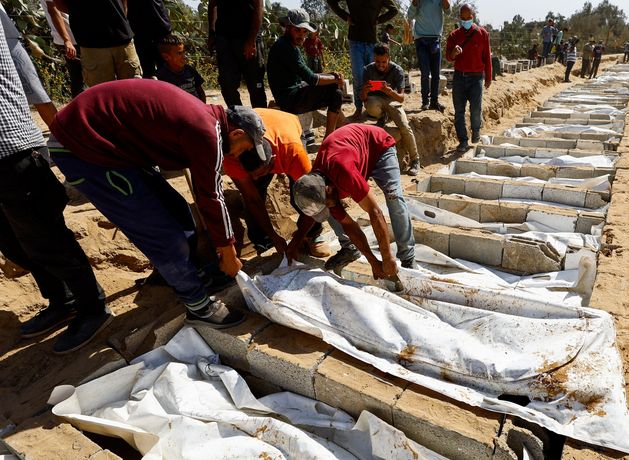Foreign minister rejects ruling and says ‘relief agency’ has been infiltrated
The panel of 11 judges added Israel has to support relief efforts provided by the United Nations in the Gaza Strip, and UN entities, including UNRWA, the United Nations Relief and Works Agency for Palestine Refugees in the Near East.
“As an occupying power, Israel is obliged to ensure the basic needs of the local population, including the supplies essential for their survival,” presiding judge Yuji Iwasawa said. He added that basic needs include food, water, shelter, fuel and medical services.
Advisory opinions of the ICJ, also known as the World Court, carry legal and political weight, but they are not binding and the court has no enforcement power.
.jpg)
People bury unidentified bodies of Palestinians who had been held in Israel during the war, after they were handed over by Israel in Gaza, in Deir Al-Balah, in the central Gaza Strip, yesterday. Photo: Reuters
Today’s News in 90 Seconds, Thursday, October 23
The opinion, which was requested by the UN General Assembly in December, clarified the protections states must provide for UN staff and is expected to have effects beyond the Gaza conflict.
In a post on X, Israel’s foreign ministry said it categorically rejected the court’s findings and added “Israel fully upholds its obligations under international law”.
Israel banned UNRWA from operating in Gaza last year, claiming that some of its employees were members of militant group Hamas, or other affiliated associations.
UN officials say it was nowhere near what was needed to ease a humanitarian disaster
The ministry said that the United Nations had yet to fully probe the extent of Hamas involvement in UNRWA, and said Israel would not co-operate “with an organisation that is infested with terror activities”.
The ICJ judges yesterday found that Israel had not substantiated its claims that a significant number of UNRWA employees are Hamas members.
In April this year lawyers for the United Nations and Palestinian representatives at the ICJ accused Israel of breaking international law by refusing to let aid into Gaza between March and May, a time when Israel completely cut off all goods, accusing Hamas fighters of stealing aid.
Since then, some humanitarian aid has been allowed in but UN officials say it was nowhere near what was needed to ease a humanitarian disaster which crossed the threshold into famine.
A ceasefire agreed this month calls for Israel to admit 600 trucks of aid a day, but the UN says far less is entering so far.
The ICJ opinion found Palestinians in Gaza were inadequately supplied and stressed Israel cannot use starvation as a weapon of war.
Paul Reichler, a lawyer acting for the Palestinians, said the findings meant Israel was not complying with its international law obligations.
“On the one hand, you have the court finding that starvation as a method of warfare is illegal, and on the other, the court found that Israel deliberately prevented food from reaching the civilian population in Gaza,” he said.
UNRWA, which serves millions of Palestinians by running schools and aid distribution, employs more than 30,000 people.
The UN said in August last year that nine UNRWA staff may have been involved in Hamas’s October 7, 2023 assault on Israel and had been fired. Israel says another UNRWA employee killed in Gaza in October 2024 was also a Hamas commander.
A bill by an opposition party proposing the annexation of the Maale Adumim settlement passed
In an earlier 2024 advisory opinion, the ICJ found that Israel’s occupation of Palestinian territories is illegal and should end immediately. The court also said that Israel had human rights obligations to the Palestinians because of its position as an occupying power.
Meanwhile, a bill applying Israeli law to the occupied West Bank, a move tantamount to annexation of land which Palestinians want for a state, won preliminary approval from Israel’s parliament yesterday.
The vote was the first of four needed to pass the law and it coincided with the visit of US vice president JD Vance to Israel, a month after president Donald Trump said that he would not allow Israel to annex the West Bank.
Prime minister Benjamin Netanyahu’s Likud party did not support the legislation, which was put forth by lawmakers outside his ruling coalition and passed by a vote of 25-24 out of 120 lawmakers. A second bill by an opposition party proposing the annexation of the Maale Adumim settlement passed by 31-9.
Some members in Netanyahu’s coalition – from national security minister Itamar Ben-Gvir’s Jewish Power party and finance minister Bezalel Smotrich’s Religious Zionism faction – voted in favour of the bill, which would require a lengthy legislative process to ultimately pass.
Members of Netanyahu’s coalition have been calling for years for Israel to formally annex parts of the West Bank, territory to which Israel cites biblical and historical ties.
